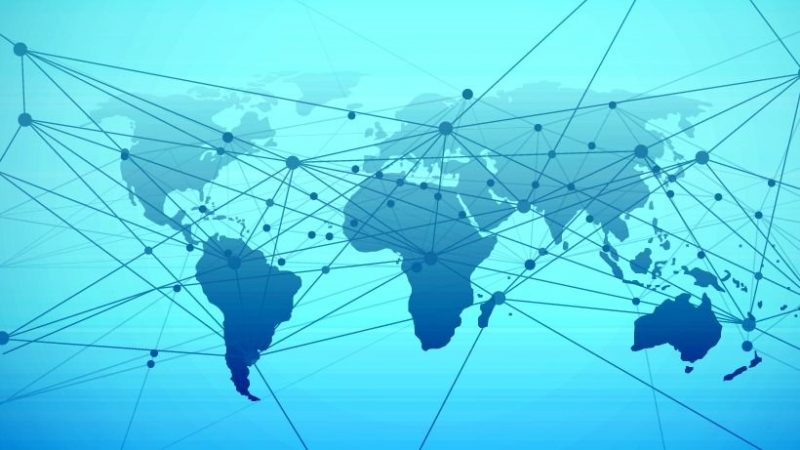The traditional aesthetics of left and right are lost in the unfolding confusion of the 21st century. Wall Street bankers, the most powerful entities on the London Stock Exchange, the Silicon Valley elites, speaking to us through CNN, Facebook, Twitter, and every high tech mechanism for molding opinion, are screaming “revolution!”
The Arab Spring seemed to be the opening explosion, and the fallout from that geopolitical disaster continues. Libya went from being the African country with the highest life expectancy and most prosperous economy to its present condition as a failed state, with refugees fleeing and terrorists setting up shop. Syria has faced over half a decade of civil war, as western-backed “revolutionaries” who beheaded children and bombed churches unleashed hellish conditions in the hopes of toppling a government led by Baathist Arab Socialists. Western media now cheers for mobs of enraged students and armed extremists who work to topple the governments of Nicaragua and Venezuela, decrying the popular, elected Bolivarian leaders as “dictators.”
Powerful voices from the western world are screaming almost in unison: “revolt!” But revolt against what? For what purpose? What is the goal of this highly romantic, but ideologically vague CNN-led revolution? No answer has been provided. It is as if the ghost of Leon Trotsky has shed his socialist aspirations, kept only his fixation on barricades and firing squads, and taken the helm of western geopolitics.
The nightmare playing out before our eyes is very much the consequences of Wall Street and London’s new “revolutionary” impulse. Refugees are pouring into western countries. Acts of terrorist violence are becoming far less infrequent. Among CNN’s beloved “revolutionaries” in Syria and Libya, an entity called “Islamic State” has emerged, utilizing all the media savvy that Hollywood and Silicon Valley has perfected to sell destruction. In reaction, among the less powerful sectors of the European and American elite, a “new right” of “anti-globalists” and “isolationists” now calls for a retreat from these horrors of the “global community.”
During the Cold War, the leaders of NATO countries accused the Soviet Union of “spreading chaos.” They invoked memories of the Communist International, and presented the Soviet Union as attempting to conquer the world under the guise of a proletarian revolution. Yet, today, the calls for revolution come from Washington, London, Paris, and Berlin. Those who oppose this call, and champion stability and security are deemed to be “fascists.”
The Economic Roots of a Civilization Crisis
Like most things, the roots of these bizarre political manifestations in our time can be found in economics. At the time of the Arab Spring in 2011, the primary issue was mass unemployment; millions of rural jobless people were piling into the urban centers of the Middle East, sleeping in graveyards and rioting for food. But joblessness and underemployment wasn’t unique to the region. Jobless young Americans occupied Zuccotti Park in lower Manhattan, after observing jobless Greeks and Spaniards occupying their universities and town squares months before.
The computer revolution has forced the human race to remember the prophecies of Karl Marx. While Marx’s call for a glorious international worker’s revolution may have been disappointed his more scientific predictions about the fundamental workings of the profit-centered economy are ringing truer than ever.
Marx’s close collaborator, Frederich Engels explained his comrade’s basic, non-moralist critique of capitalism this way:
“We have seen that the ever-increasing perfectibility of modern machinery is, by the anarchy of social production, turned into a compulsory law that forces the individual industrial capitalist always to improve his machinery, always to increase its productive force….
The extension of the markets cannot keep pace with the extension of production. The collision becomes inevitable, and as this cannot produce any real solution so long as it does not break in pieces the capitalist mode of production, the collisions become periodic…
Commerce is at a stand-still, the markets are glutted, products accumulate, as multitudinous as they are unsaleable, hard cash disappears, credit vanishes, factories are closed, the mass of the workers are in want of the means of subsistence, because they have produced too much of the means of subsistence; bankruptcy follows upon bankruptcy, execution upon execution. The stagnation lasts for years; productive forces and products are wasted and destroyed wholesale, until the accumulated mass of commodities finally filter off, more or less depreciated in value, until production and exchange gradually begin to move again.
Little by little, the pace quickens. It becomes a trot. The industrial trot breaks into a canter, the canter in turn grows into the headlong gallop of a perfect steeplechase of industry, commercial credit, and speculation, which finally, after breakneck leaps, ends where it began — in the ditch of a crisis.”
This is the crisis of the 21st century. As 3-D printers churn out products that once required hundreds of industrial workers to produce, as fast food workers sweat on hamburger assembly lines with the ‘short order cook’ as a distant memory, as fracking wells and deep sea drills extract more oil and gas than ever before, as online retailers close down shopping centers, as a vast, globalized high tech apparatus of production rolls onward, seemingly without workers, the overall standard of living is dropping.
The millions who are left “outcast and starving” cannot even begin to purchase the huge amount of goods being so efficiently produced without them. The 2008-2009 financial crises were rooted in attempts to solve an unsolvable problem with credit deregulation. The spending power of the global working class is dropping, while the efficiency of production has risen higher than ever before.
The strength of western governments during the Cold War came from the “aristocracy of labor” i.e. the working class people of America, Britain, France, Norway, and Sweden, who enjoyed a comfortable lifestyle, high wages, and thus were patriotic and loyal to “free world” against Marxist opposition.
The construction workers who beat up anti-war activists in the Hard Hat riots of 1970, the “Archie Bunker” base of American militarism, signified a strata of comfortable conservatives that was essential in maintaining order. But this strata is now fading away into nothing, The reality of a low wage, service sector economy and a rising police state is replacing the “white picket fence” American dream of the post-war industrial days.
The Eurasian Alternative
However, elsewhere, a different political and economic model is thriving. If one looks at Iran, Russia, China, Venezuela, Nicaragua and Syria, it is hard to find ideological consistency. These governments are Secular, Atheist, Catholic, Orthodox, and Islamic. They are nationalists, theocrats, Baathists, Communists, and social-democrats.
Yet, in all of these countries the state has taken control of the centers of economic power. Russia re-emerged from the nightmare of the 1990s with an economy centered around Rosneft and Gazprom, two gigantic state-controlled corporations. They were “National Champions” controlled by state central planners, functioning to serve the nation. In Iran, the largest economic entity is the Islamic Revolutionary Guard Corps, controlling major industries and vital resources. China’s market reforms have allowed a large, private sector to prosper, but at the end of the day, the party’s control over the state-controlled banks and industries dictates production. Bolivarianism, Baathism, and other anti-capitalist theories from the formerly colonized world may be a deviation from the Marxism of Soviet textbooks, but all of the 21st century anti-imperialists are quite clear about who should control the means of production, and why the rule of profits keeps the world chronically poor.
As western capitalism drowns in the high-tech- market-spawned chaos, the societies where the state is strong enough to mobilize the population and control the economy continue to march forward, slowly but surely. The Belt and Road from China, Moscow’s Eurasian Economic Union, and other alternative economic structures have made it possible for nations to flourish without the IMF and World Bank.
Neoliberalism has reduced governments to the role of helpless bystanders amid economic catastrophe, but the concept of Statecraft which built civilization, is alive and well across Eurasia. In sections of the globe not gripped by dropping wages alongside endless ipods, or homelessness amidst skyrocketing rent, the government is not keepings its hands off. In the rising alternative, the mantra is not “the government is best which govern least.” Rather, the government is deemed best when it delivers the goods, and advances the interest of the population directed by it.
As farms sprout up across Russia’s Far East, and the state controlled steel industry of China grinds forward, despite Trump’s tariffs, it is clear that the crisis of overproduction does not menace societies in which the economy is not “free to choose.” When the state has the power to direct economic activity and manage production, the irrational horrors of starvation amidst plenty can be abetted.
The forces that dominate the crashing and burning global economy are not motivated by ideology. They seek to make profits, and the key to maintaining profits is monopoly. They seek a planet that can function as a captive market, buying and selling only from them.
Holding Back Technological Progress
Oil is central to maintaining this monopolistic power. The Wahabbi Saudi Monarchy and its Arab state vassals, Africa’s Niger Delta displaying poverty drenched in black gold, the fracking colonies of North Dakota, and the Gulf of Mexico’s deep sea oil rigs, all function as tentacles of the western financial centers. Chase Bank (Exxon-Mobil), HSBC Bank (British Petroleum), all see independent oil and gas producing states like Russia, Venezuela, and Iran as annoying competitors. If they suffered the same fate as Libya and Iraq, profit margins would only expand.
The real danger to the monopolist global order of Wall Street and London oil bankers comes from new technology. China’s “New Energy Vehicle” laws made the mineral markets explode with demand. Fusion energy, artificial intelligence, supercomputers, hyperloop trains, all the hope for humanity made possible by the computer revolution, spell the end of those who have cornered the oil market and the economy of the dying old world.
Meanwhile, Silicon Valley attempts to control the information explosion it launched, realizing that sooner or later social media and cybernetics will no longer be under their dominion. Tightening their grip only expedites the process of the new world utilizing new technology against the old world that created it.
So, what is their only hope? Chaos. Revolution. Regime change. Deconstruction. Destruction. Disobedience. Dysfunction. Maintaining underdevelopment.
The only hope for staying on top of the mountain is to reduce the valley to chaos. In our bizarre post-modern civilization crisis, the emperors of a falling Rome are themselves dispatching the barbarians. The forces who once screamed “containment” and “law and order” hoping to hold off the Marxist menace, now unfurl an ideologically cleansed banner of revolution in the hopes of tearing down any possible alternative or rival.
Like the feudal-preservationists who rallied around Robert Malthus, they talk of “reducing the population” to hold off the inevitable. Meanwhile, Hollywood movies churns out repeated psychological rehearsals for the apocalypse.
The only hope for the dying order is that history can be stopped by a wave of chaos and destruction. But history marches forward, regardless, and civilization has not surrendered.

















Leave a Reply